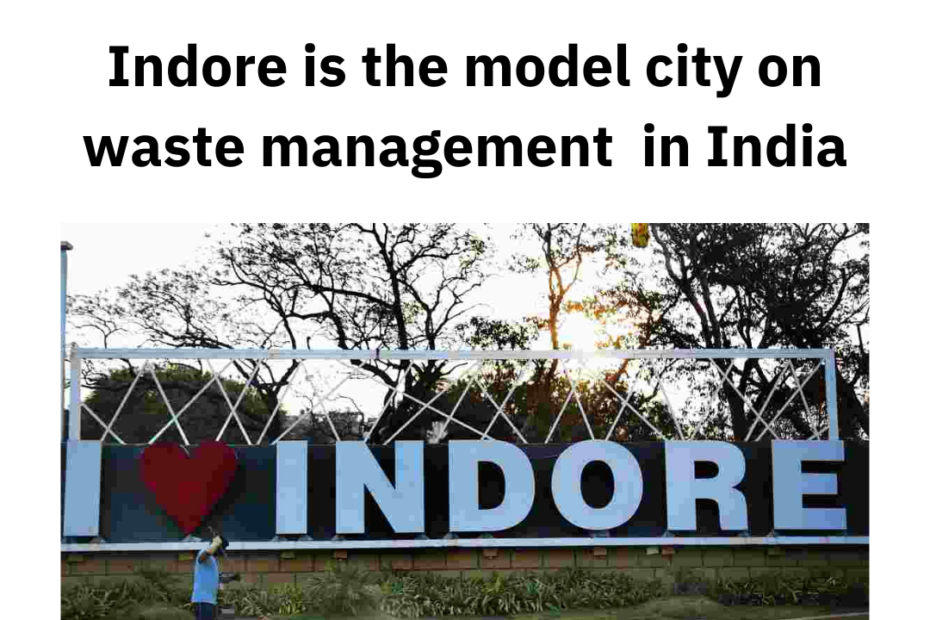According to a report ‘Waste wise Cities’ published by NITI Aayog, Urban India generates 50 million MT of municipal solid waste per year, and this is projected to increase to 125 million MT per year by 2031. To efficiently manage this amount of waste, a strong and efficient waste management system is required to be implemented in every city in the country. The advent of the Swachh Bharat mission started the drive for cleanliness and expedited the waste management efforts in the country. From 2014 to 2021, waste processing capability is improved from 18% to 70% which is commendable.
Many cities are incorporating waste management practices and Indore the largest and most populous city in Madhya Pradesh, India has set an example for the whole country for best waste management practices. Indore is ranked number one among the cleanest cities in India, with 100% door-to-door waste collection and 100% waste processing. It has shown that strong coordination among administration, community engagement, and technology can bring exemplary results.
How Indore achieved this position- The main drivers that helped Indore in achieving and maintaining its position are community engagement and behavioral change, participation of NGOs and private companies, technology, and strong administrative will. All this together brought a huge transformation and helped the city achieve the cleanest city title consistently for the last five years. Bringing behavioral change at the mass level was the most challenging task and Indore achieved this through consistent efforts like –
- Frequent knowledge and trust-building sessions for citizens by the municipality
- Running creative campaigns with the punchline ‘Do Bin Har Din’ (two bins every day) in the beginning. The campaign was a huge success in residential and commercial areas as people slowly started segregating wet and dry waste
- Use of social media along with nukkad nataks, wall paintings, radio, etc
- Schools were engaged to promote waste segregation among students through competitions focused on cleanliness, and through oath-taking ceremonies in the morning assembly
- Talks by religious and community leaders on the importance of cleanliness as mentioned in religious books and mass road-sweeping exercises to spread awareness
- Fines on households for not cooperating
How the waste collection system works in Indore – A robust collection system, along with infrastructure facilities such as collection monitoring cell, waste processing – composting or bio-methanation units, collection vans, etc. set up by Indore Municipal Corporation (IMC), NGOs, and private entities added the effectiveness in Indore’s waste management practices. Currently, citizens are encouraged to segregate the waste into six categories, such as biodegradable, non-biodegradable, plastic, sanitary, domestic hazardous, and electronic waste. The waste is collected from different sources such as households, hospitals, commercial spaces, etc. IMC has set up a limit of 50 kg, waste under 50 kg is eligible for door collection. For entities generating waste of more than 50 kgs, they are asked to manage biodegradable waste at their site by themselves or through private waste management services. Every morning garbage collecting vans will go door-to-door and collect segregated waste from households. Each van has GPS and a special department of IMC remotely monitors these van routes and takes corrective actions if any problem arises.
Waste processing – The waste collected is taken to different transfer stations to ensure proper segregation before taking it to waste processing facilities. After segregating, organic waste is sent for composting and manure generated is sold to farmers. Recyclable waste is sold to respective recycling companies and non-recyclable waste, construction waste is sent to cement and M.P. rural development corporation. Biodegradable waste is processed in a composting and two separate Bio-methanation facilities. This has resulted in processing around 630 tonnes of biodegradable waste every day and helped the city earn about Rs. 52 lakhs through carbon credits obtained by saving the GHGs that otherwise would be emitted.
What the city has achieved – Apart from a consistent number one position all over India, Indore has achieved trust, unity, and a sense of oneness among its citizens and administration. As the success became evident, citizens now know that together they all are contributing towards a big change and feel pride in their city. The initiative has empowered many marginalized women and provided them with jobs in waste processing, recovery, and collection activities. This shows that well-planned, coordinated, consistent actions with strong will can bring transformation at a tremendous scale and set exemplary models for others to follow.
Sources-
https://www.indiaspend.com/how-indore-became-indias-cleanest-city-and-how-others-can-follow/
https://www.niti.gov.in/sites/default/files/2021-12/Waste-Wise-Cities.pdf
https://www.smartcityindore.org/solid-waste/
